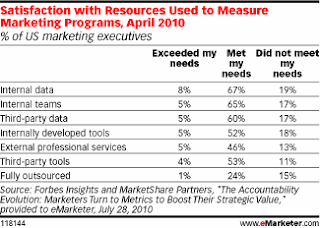Most U.S. marketers are using analytics. They recognize the importance of measuring marketing effectiveness, especially when they are asked to justify their spending. However, according to a report by eMarketer, there is room for improvement in formalizing approaches and communicating results.
According to a survey of senior marketing executives by Forbes Insights and MarketShare Partners, nearly seven in ten said they used analytics to measure marketing effectiveness. Marketers with large budgets were significantly more likely to do so than those with spending of less than $1 million. But, many in that group planned to adopt analytics in the future.
Many marketers still take an informal approach to measurement. Among those with budgets over $1 million, while 85 percent said they used analytics, 71 percent said they had a formalized way of doing so.
Marketers focused most on internal resources to measure the success of their programs, with 86 percent using internal data, 74 percent relying on internal teams and 52 percent on internally developed tools.
In comparison, 58 percent used third-party data and only 35 percent employed outside professional services.
Much of this effort is directed toward justifying marketing programs, but the marketers surveyed often lacked an effective way of communicating the success of their campaigns to other executives. While three-quarters of marketers begin initiatives with clear goals set out, only 56 percent have a system for assessing the campaign's business impact.
I wonder what percentage of marketers actually use analytics reports to make ongoing changes to their marketing practices. I suspect that most companies only look at the historical data to assess past performance. Few use it for forward-looking projections, or as a basis for realigning marketing spending.
